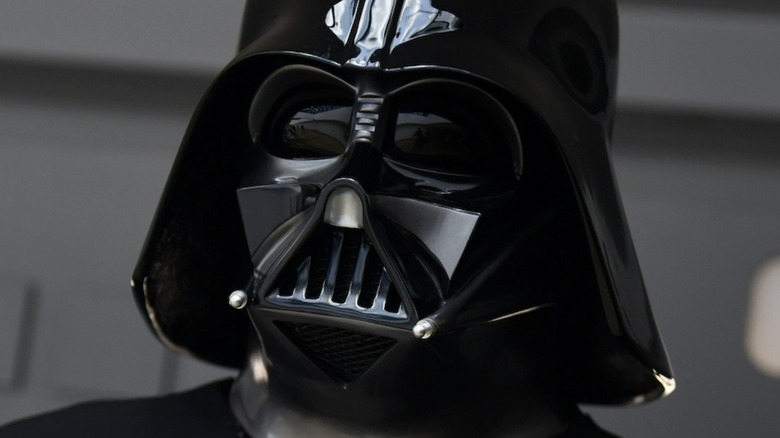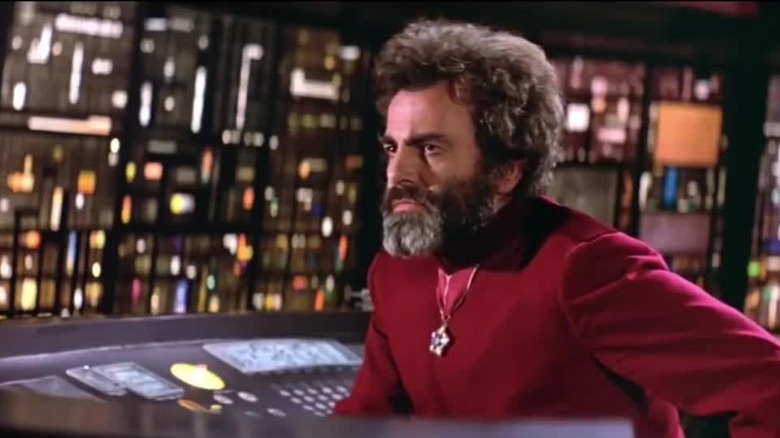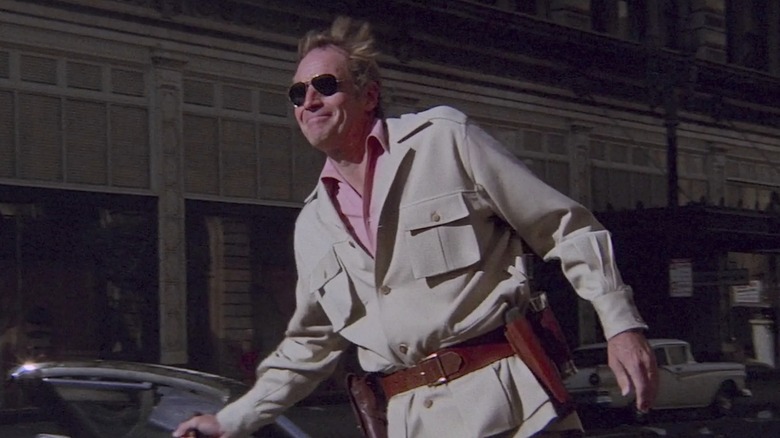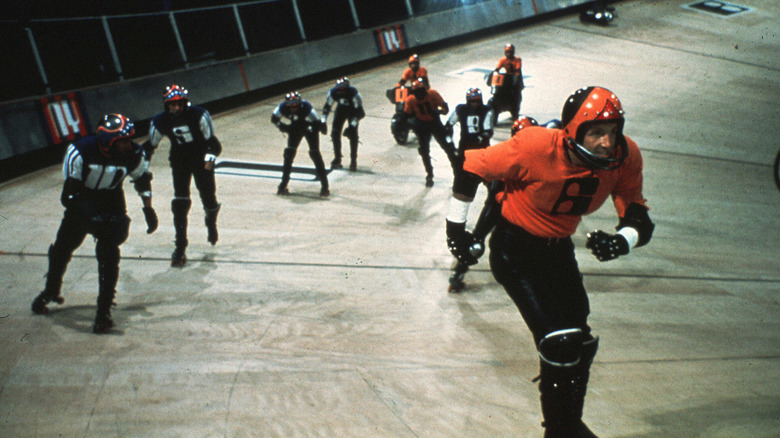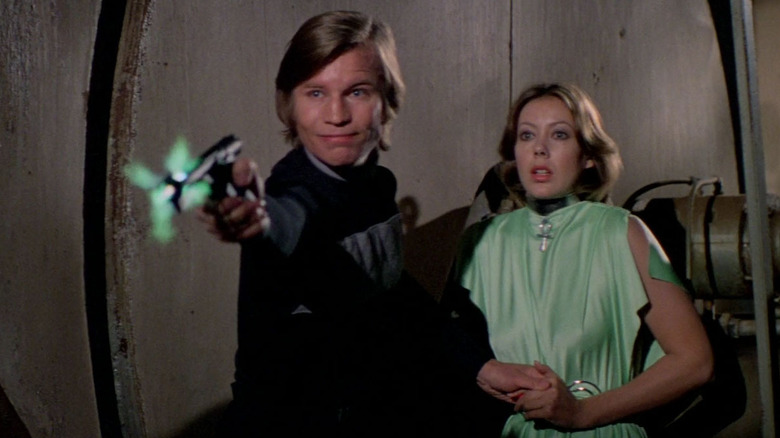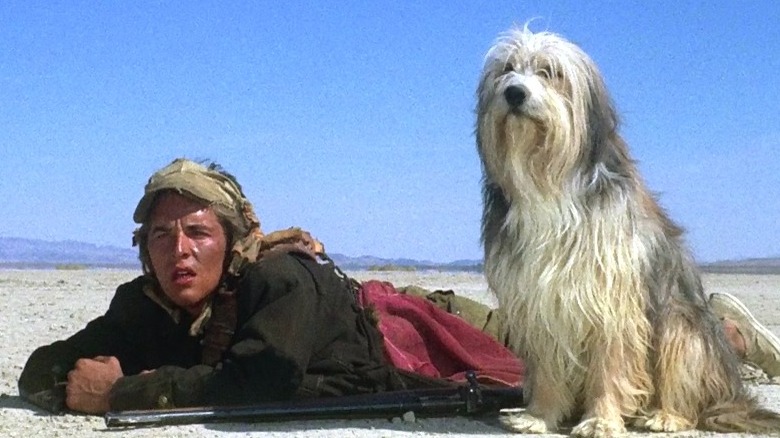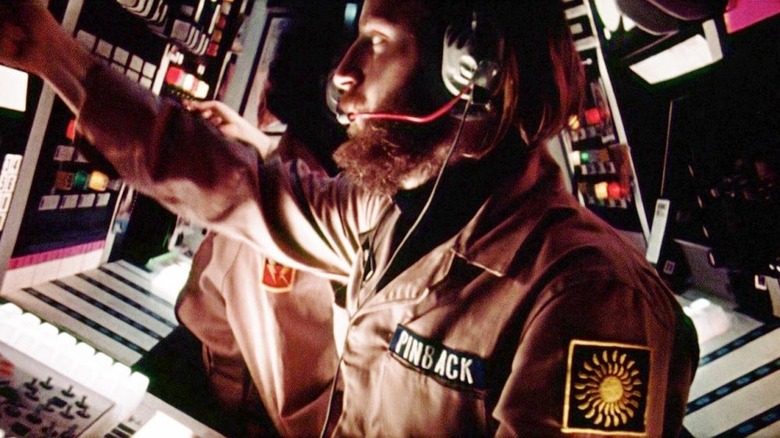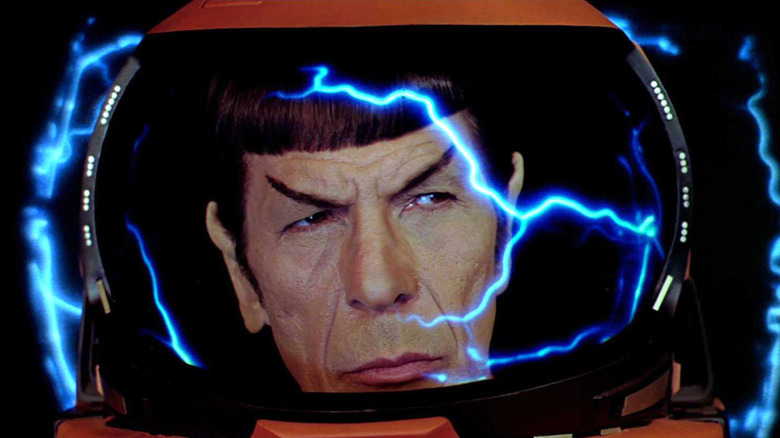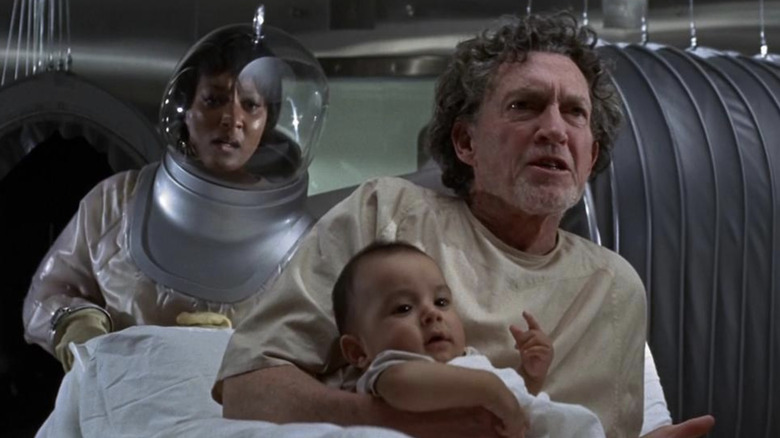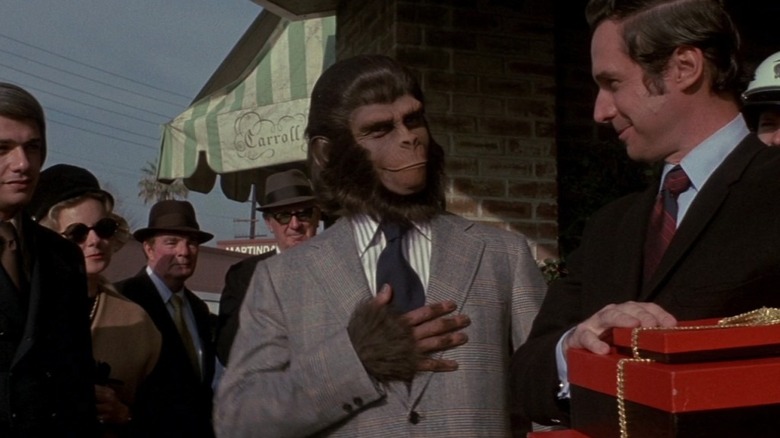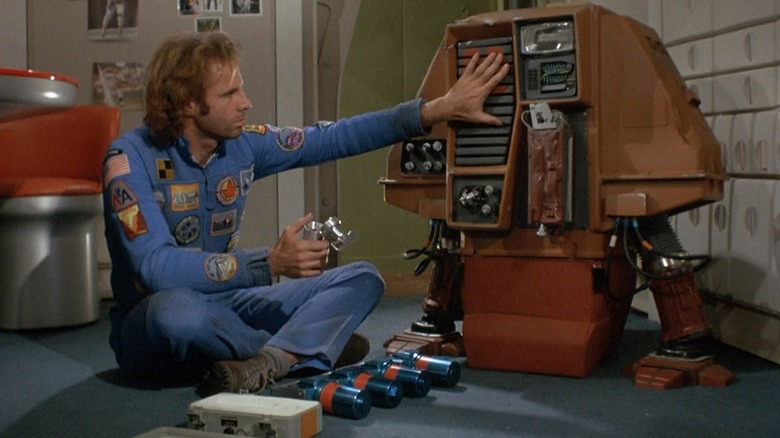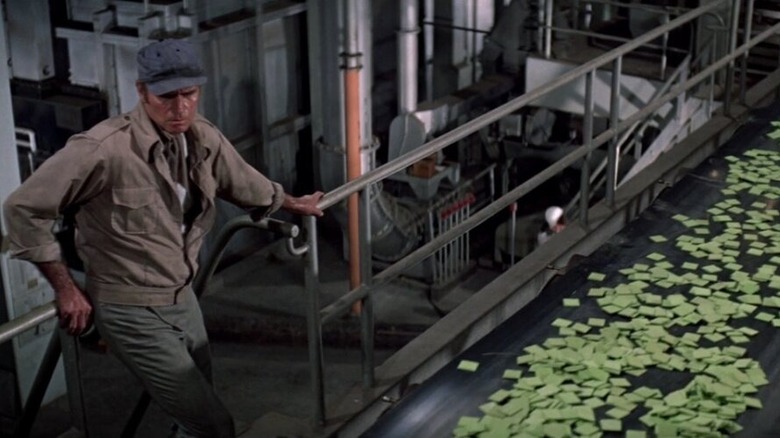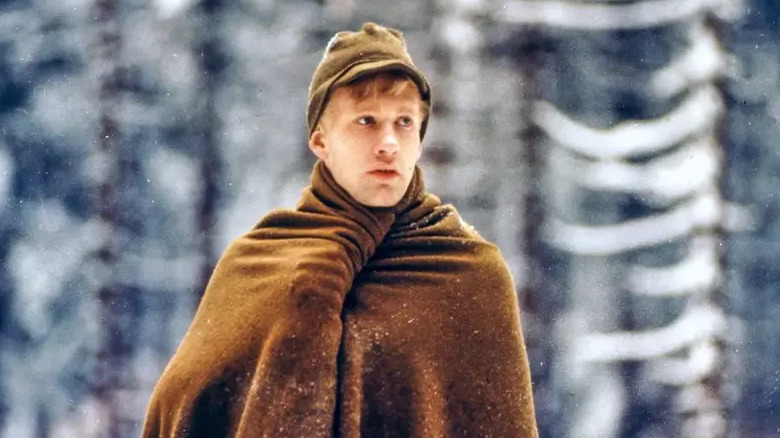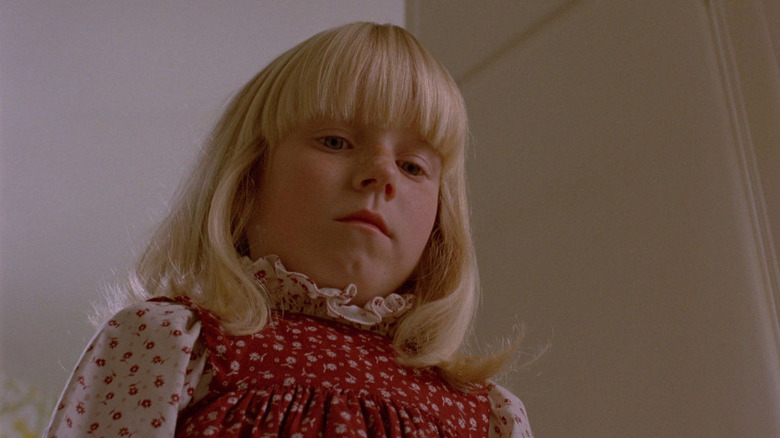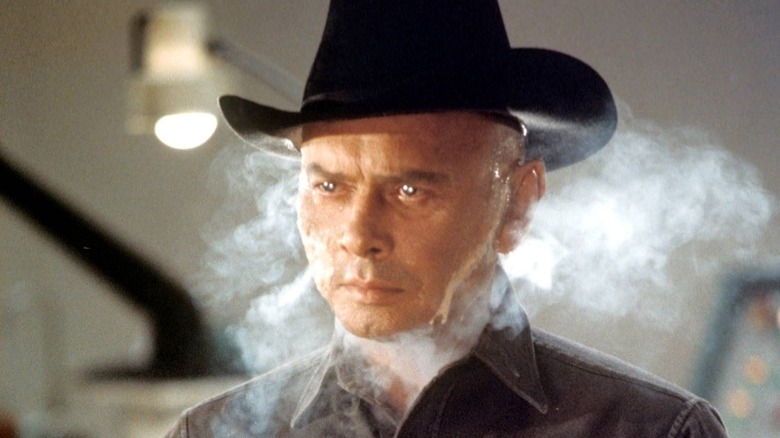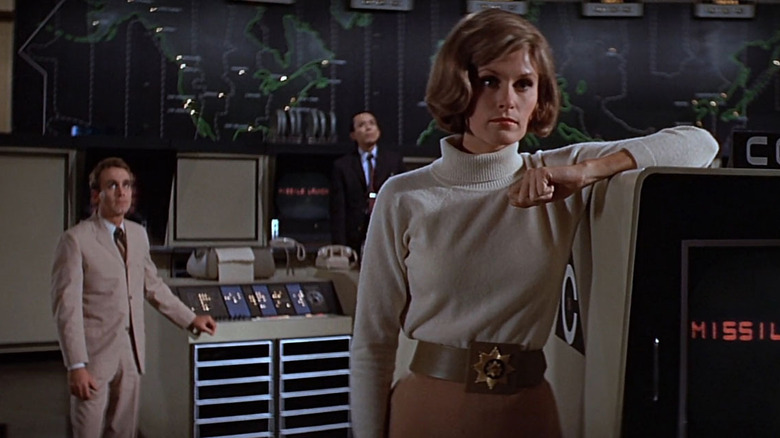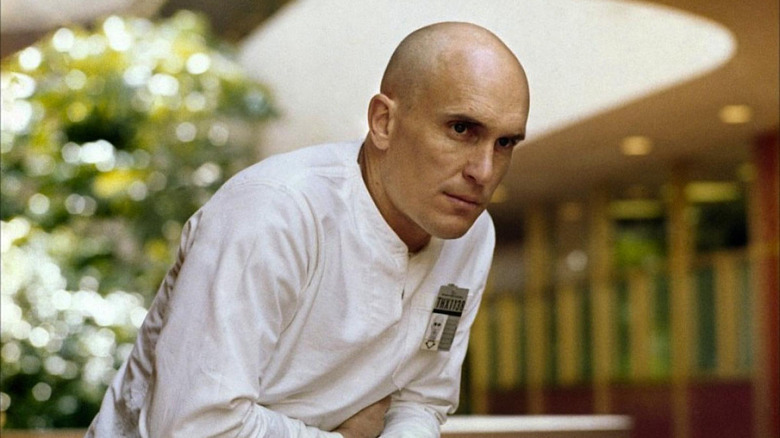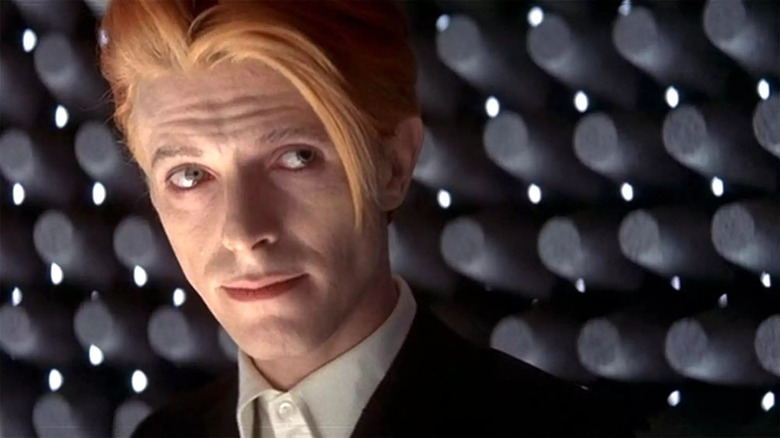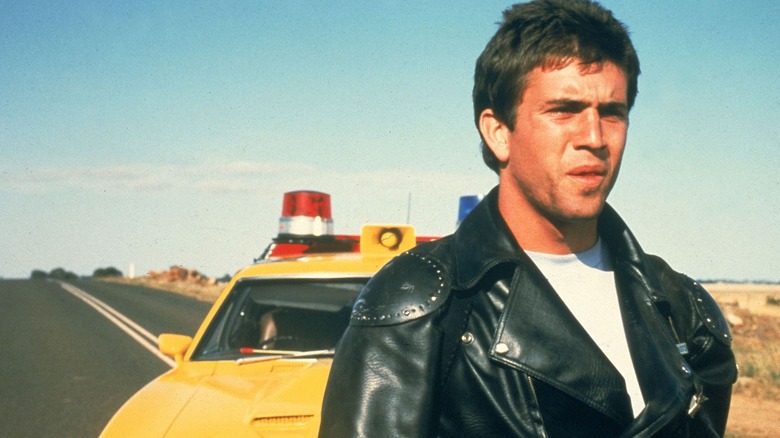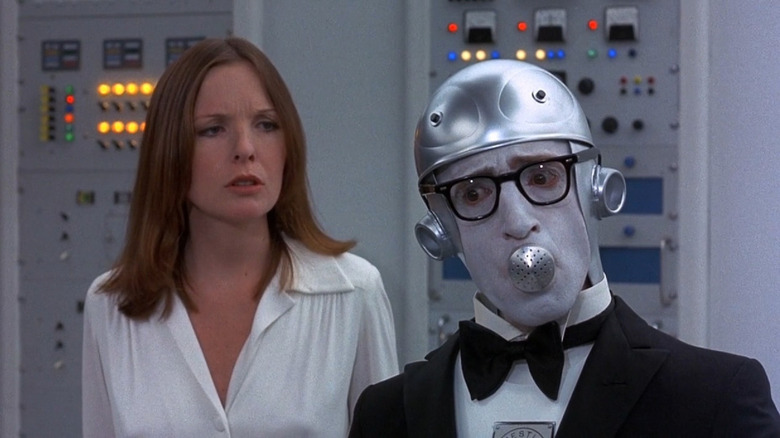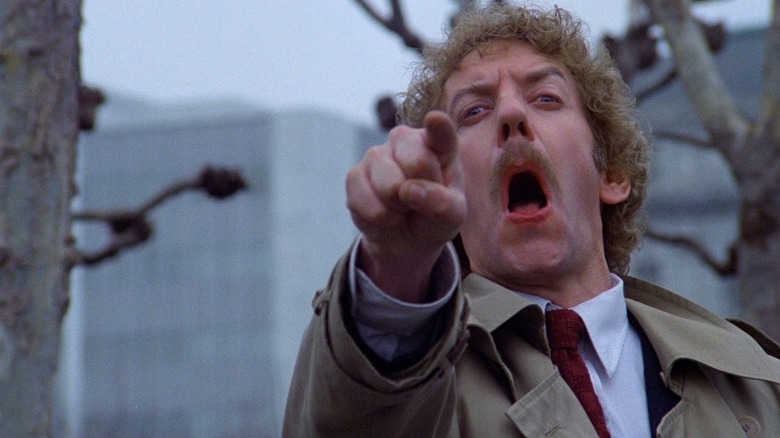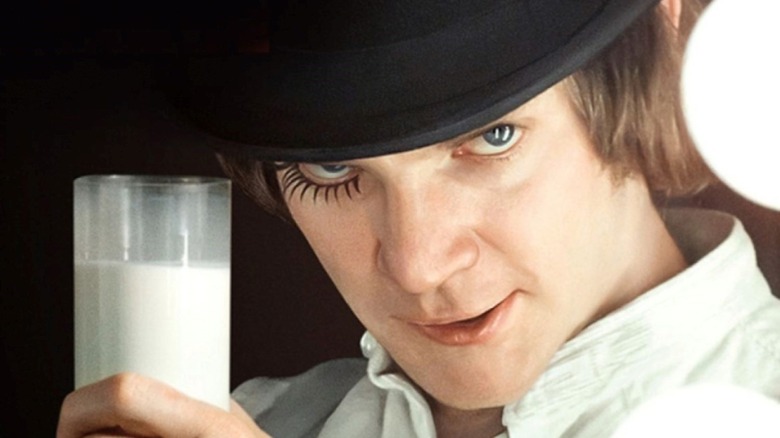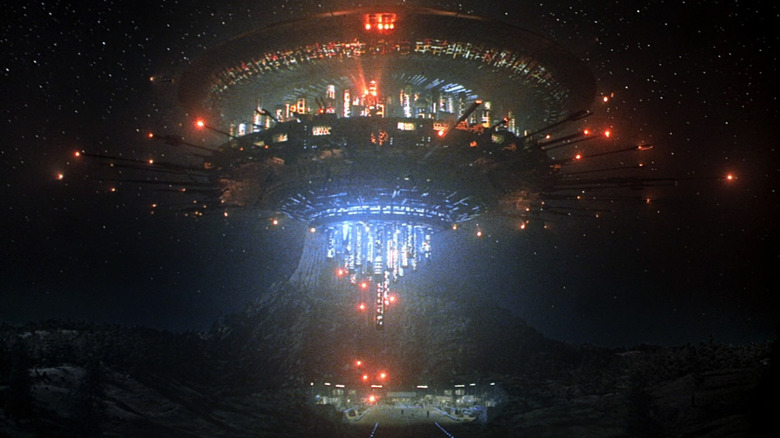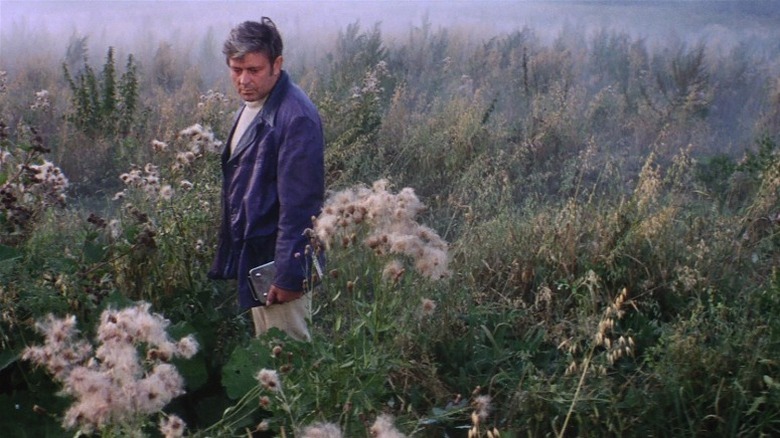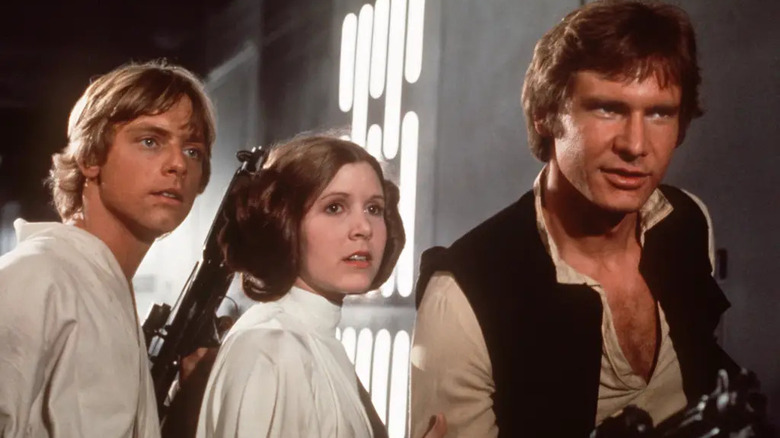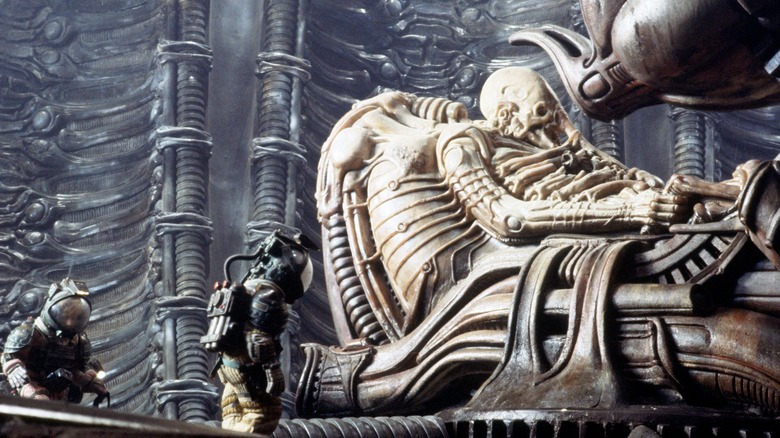The 25 Best Sci-Fi Movies Of The '70s Ranked
The 1970s were a time of great upheaval in America, with the Civil Rights movement not far in the rear view mirror, the Vietnam War raging, and political scandals rocking the nation. Meanwhile, following the success of '60s classics like "Planet of the Apes" and "2001: A Space Odyssey," Hollywood was finally taking science fiction seriously, making the genre the perfect place to explore the many issues facing the country — and the world.
As quantum leaps in special effects technology were happening too, it became even easier to produce hard-hitting, high quality sci-fi films with enough believability to dazzle mainstream audiences and make big box office bucks at the same time. One could even argue that the 1970s were a revolution in science fiction, producing groundbreaking films like "Alien," "Close Encounters of the Third Kind," and of course, "Star Wars." Whether they were packed with big budget adventure, or were slow-moving cerebral explorations of society's ills, the 1970s were a unique era in the genre.
While you may suspect which films land at the top of this list, you might also be curious about what other wonders await. So switch on the navi-computer and set deflector shields to full power ... you're about to journey through our ranked list of the best science fiction films of the '70s.
25. The Black Hole
Produced by the Walt Disney Company, largely in response to the success of "Star Wars" two years earlier — a franchise that the company would ironically own in the next century — "The Black Hole" was an attempt to kickstart a new family-friendly sci-fi property (via TCM). Starring Anthony Perkins, Ernest Borgnine, Robert Forster, and Academy Award winner Maximillian Schell, the film mixed elements from different science fiction films to create something wholly unique.
The movie tells the story of the USS Palomino, a spacecraft captained by Dan Holland (Forster), with a crew that includes journalist Harry Booth (Borgnine), psychic Kate McCrae (Yvette Mimieux), and scientist Alex Durant (Perkins), accompanied by a robot assistant (voiced by Roddy McDowall). While on their voyage back to Earth, they come upon a curious black hole. Orbiting its event horizon is the USS Cygnus, a ship thought lost for years on which McCrae's father had served. Aboard the Cygnus, however, they find only Hans Reinhardt (Schell), a brilliant scientist who claims he has constructed an army of robots to investigate the black hole.
As the Palomino's crew learn more, they soon discover something far more sinister than a simple research mission. Though the film never did achieve great success, and ends on something of a cliffhanger, "The Black Hole" remains a cult classic for its outer space mystery, strong cast, and mind-blowing final act.
24. The Omega Man
Thanks to his huge 1968 hit, "Planet of the Apes," Charlton Heston suddenly found himself cast in science fiction adventures in the next phase of his career. Following a brief appearance in 1970's "Beneath the Planet of the Apes," next up for Heston was a dystopian thriller based on "I Am Legend," the classic novel by horror and sci-fi writer Richard Matheson. While there had already been one adaptation, 1964's "The Last Man on Earth," this new retelling put a decidedly '70s spin on the story.
Heston stars as Robert Neville, a scientist who wanders a desolate, nearly uninhabited Los Angeles and may be the last normal human being on Earth. This future world has been ravaged by a deadly global plague, the result of bio-warfare between the United States and Soviet Union, but Neville has managed to immunize himself at the last minute with an experimental vaccine. Neville now navigates the empty streets, hunting the members of a cult of twisted, bloodthirsty mutants who in turn come out at night to terrorize him.
Though not critically well-received at the time, the movie has aged like fine wine, with its unsubtle anti-war message at the height of the Cold War helping it become a beloved classic. Though not entirely faithful to Matheson's original story, the film has remained in the hearts and minds of many for decades, and was remade in 2007 under its original title, "I Am Legend."
23. Rollerball
The late actor James Caan may be best known for his role as Sonny Corleone in "The Godfather," but three years later he starred in a film that was as far from the epic mobster movie as one could get. A mix of sports drama and science fiction, "Rollerball" may look a little goofy today thanks to its '70s-era production, but at the time it was another movie that mixed some cutting political satire into its fast-paced action and sci-fi setting.
The world of 2018 is very different in "Rollerball," with mega-corporations controlling most of society (okay, maybe it's not all that different) and a dangerous sport called rollerball ruling the airwaves across the globe. A maverick star of the game, Jonathan E. (Caan), is pressured into retiring by the Energy Corporation, but when he refuses, they alter the rules of the sport in increasingly more deadly ways to try to force him out. Learning that his corporate masters fear him because of the power his celebrity status brings, he realizes that his very presence threatens the security and control of their regime, and he decides to fight back.
With a stirring story and plenty of gruesome, violent action, "Rollerball" was hailed by Variety as "a sensational futuristic drama ... [starring] James Caan in an excellent performance as a famed athlete who fights for his identity and free will."
22. Logan's Run
Like many '70s sci-fi flicks that arrived in the days before "Star Wars," the 1976 adventure "Logan's Run" mixed a thoughtful story and social message with over-the-top visual spectacle, making it one of the most expensive films of its time (via TCM). Commenting on society's veneration of youth and the increasing class divide, the film explored some important cultural issues through the lens of science fiction.
Starring Michael York and Jenny Agutter, "Logan's Run" is set in a future where the world's populations are confined to large domed cities. The year is 2274, and the cities are run by elaborate computers that plan for all the people's needs in a carefully constructed society. Overpopulation is the biggest concern, and is strictly managed by a ritual called Carousel, a practice that executes all people when they reach the age of 30.
Logan 5 (York) is a Sandman, a futuristic lawman who hunts down those who attempt to escape Carousel, known as "runners." With his age accelerated by the computers so he can go undercover as a runner and confirm the existence of Sanctuary – where people are said to be able to live out their natural lives — Logan soon begins to question the very nature of his world.
A powerful counter-culture story delivered at just the right time, "Logan's Run" is also a fun, colorful adventure. It spawned a short-lived TV series, and has been the subject of remake rumors for years.
21. A Boy and His Dog
Science fiction saw the rise of the post-apocalyptic subgenre in the 1970s, and one of the unsung greats remains "A Boy and His Dog," a film that, despite its quality, has remained lesser known in mainstream culture. Helmed by actor-turned-director L.Q. Jones and starring a young Don Johnson, the film was based on a story by acclaimed sci-fi author Harlan Ellison, who wrote some of the best episodes of "The Outer Limits" and "Star Trek" the decade before.
Set in 2024, the world has been ravaged by nuclear war, with cities all but gone and the landscape little more than a lifeless wasteland. A young boy named Vic collects scraps to survive, hunting for food and women, with the help of a telepathic pup named Blood (voiced by Tim McIntire). When Vic meets a beguiling young woman named Quilla (Susanne Benton), he is tricked into joining her small surviving community, leaving Blood to wander the world on his own. But when Vic realizes this new society has pernicious plans for him, he must escape and reunite with Blood.
Despite its heartwarming title, "A Boy and His Dog" features some unexpectedly dark themes that rear their ugly head, with the story serving as an examination of human morality. Unsettling to critics at the time, it's now seen as a unique film and a genuine cult classic.
20. Dark Star
Legendary horror director John Carpenter released his very first classic in the early 1970s, but it wasn't "Halloween." Instead it's the science fiction comedy "Dark Star," a film with a convoluted history (via The Guardian): Starting out as a short student film, it was written by Dan O'Bannon, who would go on to script Ridley Scott's "Alien." Over time, the production evolved with newly added material and more money to become a full-length feature film. Eventually released theatrically in 1974, with a wider release in 1980, it's a less-than-polished film, but one with a lot to offer.
A satire about the life of blue collar laborers, "Dark Star" switches out earthbound workers for the crew of a work-a-day spaceship on a mission to annihilate rogue planets that are obstructing interstellar colonization. The crew includes laid-back surfer Lt. Doolittle (Brian Narelle) and class clown Pinback (O'Bannon). They're tired and growing wearier, and as the tedious and repetitive days drag on, they must deal with both everyday monotony and ship malfunctions that could kill them all at any moment.
A movie whose influence on the genre is evident with a decidedly grungy look and tone, "Dark Star" may be a little rough around the edges. Nevertheless, the film at the time was a clever breath of fresh air and a change of pace from the usual dark themes and message-heavy nature of other sci-fi movies of the day.
19. Star Trek: The Motion Picture
Arriving a decade after the cancellation of the iconic TV series, "Star Trek: The Motion Picture" was originally developed as a pilot for a relaunch on the small screen. But after the success of "Star Wars," the studio turned the story into a massive, big-budget feature film. The entire cast of "Star Trek" returned, led by William Shatner as now-Admiral Kirk, who re-assembles his crew for a new mission.
Set several years after their adventures on the small screen, the film opens with the Enterprise being refit and a new captain in command. But when a gigantic, dangerous cloud heads toward Earth, destroying everything in its path, Kirk enlists the help of his former officers Mr. Spock and Dr. McCoy as he is put back in the captain's chair to determine the nature of the intruder. When the Enterprise crew makes contact, they discover the cloud houses V'Ger, an apparently ancient artificial intelligence, and it's up to Kirk and his crew to figure out what it wants.
The film earned a divided reaction at the time, with some critics loving its scope and scale, and others mystified by its slower pace. But over the years, "Star Trek: The Motion Picture" has become more appreciated for its intelligence and unique charms. Though it wasn't the "Star Wars"-sized blockbuster the studio may have wanted, it was still a sizable box office hit for its time. It was followed by five sequels with the same cast, and turned a low-budget 1960s TV series into one of the biggest sci-fi franchises ever.
18. The Andromeda Strain
Acclaimed novelist Michael Crichton has created a number of television shows and movies, including "Twister" and "ER," while his books like "Jurassic Park" and "Disclosure" have been adapted into hit films. The 1970s saw several of Crichton's early projects emerge on the big screen, with the first feature adaptation of one of his novels, "The Andromeda Strain," landing in 1971. Like many of his works, which have always been heavier on the science than the fiction, "The Andromeda Strain" was a mix of medical drama and sci-fi thriller.
The story begins in a small town struck by a mysterious plague that may have originated in space, wiping out nearly the entire population of the little burg with the curious exception of one elderly man and a single infant. A team of specialists descend upon the town and bring specimens, samples, and patients to a top secret, highly secure subterranean facility in the hopes of unraveling the secrets of the virus. But as the contagion begins to mutate and threatens to consume the lab, it becomes a race against time to prevent the plague from escaping to the surface and killing millions.
A nail-biting sci-fi medical chiller, "The Andromeda Strain" was lauded for its gripping suspense, while the Infectious Disease Society of America called it out among its killer-virus movie peers as "the most significant, scientifically accurate, and prototypic of all films."
17. Escape from the Planet of the Apes
In 1968, the landmark sci-fi classic "Planet of the Apes" left audiences' jaws on the floor. Written by "The Twilight Zone" creator Rod Serling from a book by Pierre Boulle and starring Charlton Heston, Roddy McDowall, Kim Hunter, and Maurice Evans, its vision of monkeys ruling the planet was both fascinating and frightening. From 1970 to 1973, the studio quickly rushed out a series of annual but mostly lesser sequels, with Serling not returning and Heston only appearing briefly in the second film.
Out of all the sequels, 1971's third installment impressed fans and critics with a unique direction that brought the action back in time to the present day. The film picks up where the previous one left off, with apes Cornelius (McDowall) and Zira (Hunter) escaping their doomed world through an unexpected time warp and landing in 1973. Once revealed to the world as intelligent, talking primates, they become instant celebrities, but soon come to the attention of a terrified U.S. government that fears them — and the ape-dominated future they portend — as a threat to humankind.
Shifting from futuristic science fiction adventure to an intriguing political thriller of sorts, "Escape From the Planet of the Apes" made the wise course to switch up the story. With strong performances from its two leads, the film is a far more focused character drama than other entries in the series, and is all the better for it.
16. Silent Running
The 1970s saw the emergence of environmental activism that culminated with the advent of Earth Day, a worldwide event aimed at promoting awareness of the challenges facing the Earth's ecosphere. The sci-fi genre, ever-eager to address topical issues, didn't miss its moment and produced "Silent Running," a space-based thriller with a powerful message about saving the planet from humanity's aggressive destruction of the environment.
Set in a future where global devastation and ecological cataclysm have ruined the planet's surface and ravaged the environment, the film establishes that mankind has converted massive star cruisers into bio-habitats to keep the last of the world's forests safe. Aboard these enormous vessels, entire ecosystems full of plant and animal life thrive, carefully maintained by a small support crew and their artificially intelligent robotic staff.
When the fleet of cruisers are told to destroy their cargo and return to Earth, crew member Freeman Lowell (Bruce Dern) defies his orders and takes it upon himself to commandeer the vessel and save the only surviving remnants of Earth's natural habitats before they vanish forever. Directed by Douglas Trumball, the VFX supervisor on the groundbreaking sci-fi classic "2001: A Space Odyssey," the film shines a light on a critical issue that's even more important today.
15. Soylent Green
Having appeared in a pair of sci-fi classics, Charlton Heston became the face of the genre in the early '70s, so it seemed a natural fit to cast him in another groundbreaking film of a future gone mad. Based on a novel by sci-fi luminary Harry Harrison, titled "Make Room! Make Room!," the 1973 film "Soylent Green" took the original story's razor-sharp satire and turned it into a treatise on consumerism and class warfare.
In the then not-too-distant future of 2022, when overpopulation has led to a food crisis and rampant poverty levels, NYPD detective Robert Thorn (Heston) is assigned to look into the death of an executive working for the Soylent Corporation. The company is the sole provider of a strange new kind of food ration supposedly made of soy protein, and the scandal has prompted questions about them that government officials don't want Thorn investigating. As he gets closer to the truth, Thorn is pulled from the case, but can't let go of the nagging feeling that something truly horrifying is going on behind the backs of an unsuspecting populace.
A cult classic with a twist ending that we won't spoil here (although you may already know it), "Soylent Green" is a brutal takedown of political corruption and social issues plaguing the world. Now a part of pop culture, its legacy has been cemented by a highly successful real world meal-replacement drink that takes its name from the film.
14. Slaughterhouse-Five
Counter-culture stories were thriving in the 1950s and '60s, and one of the best was adapted for the screen in 1972. Based on the anti-war novel by noted literary master and comic satirist Kurt Vonnegut, "Slaughterhouse-Five" was a war movie, a black comedy, and a time travel adventure all rolled into one. The film tells of the confusing life of Billy Pilgrim (Michael Sacks), an optometrist and soldier who becomes "unstuck" in time and is forced to live his life entirely out of sequence.
When we first meet Billy, he's an aging doctor in a middle class burg who is telling his life story through a letter to the editor of a major magazine. He tells the editor of the curious nature of his existence, moving back and forth through his own life in random order: from his time as a POW during World War II to his abduction by aliens in his later life, where he's held in a strange outer space zoo with only the company of B-movie actress Montana Wildhack (Valerie Perrine).
A favorite of the author himself, "Slaughterhouse-Five" was, in Vonnegut's opinion, one of the best adaptations of any of his works produced in his lifetime. With a non-linear narrative unusual for its day, the film is a tale of the human spirit with a science fiction bent.
13. The Brood
Written and directed by sci-fi/horror auteur David Cronenberg, "The Brood" was the next big step in his ascendant career ahead of such classics as "Scanners" and "Videodrome" in the 1980s. With a bigger cast and wider distribution (via TCM), the film showed off his skilled use of body horror, an emerging subgenre that Cronenberg practically willed into existence all by himself. The film was even infused with elements of his own life: Having recently gone through a bitter divorce, Cronenberg lays out the story of a newly split couple seeking help from a notorious psychiatrist, with twisted and tragic results.
After divorcing, Frank Carveth (Art Hindle) grows concerned with the behavior of his wife Nola, who has been under the care of controversial psychiatrist Dr. Hal Raglan (Oliver Reed). The doctor's methods are both unorthodox and infamous, using experimental techniques to reach the inner psyche of his patients. But when Nola's mother comes under attack from a gaggle of malformed children, Frank believes that Raglan and his secretive experiments may be somehow involved.
Heavily influenced by Cronenberg's ex-wife's use of psychotherapy following their own divorce, "The Brood" deploys his obsession with disturbing imagery and mutation to tell a story about the deep scars left from his own marital turmoil. Not for the faint of heart, the film was famously censored due to its unsettling nature, with one cut actually making the film far more disturbing than intended.
12. Westworld
Today "Westworld" is better known as a slickly produced television series from the minds of Jonathan Nolan and Lisa Joy. But the acclaimed HBO series was actually spawned from a once-forgotten 1973 film that mixed gunslinging action with sci-fi brilliance. Written by "Jurassic Park" creator Michael Crichton, the film was his directorial debut and just his second original screenplay after the lesser-known "Extreme Close-Up," released the same year.
"Westworld" was a futuristic adventure starring Yul Brynner, in a deliberate homage to his role in "The Magnificent Seven." Ten years into the future, the Delos Corporation has created a series of theme parks for the wealthy. One park, aptly known as Westworld, is an extravagant recreation of the Wild West. Adult guests can indulge in any desire they wish, from sexual pleasures to violent shootouts, with no consequences, because all of the park's inhabitants are life-like androids who feel no pain and cannot harm the guests. But when a series of cascading program errors and system malfunctions spread throughout the parks, the androids develop minds of their own, disabling their safety protocols and allowing the robotic gunfighters to turn deadly.
One of several films to warn of the coming dangers of artificial intelligence and robot technology, "Westworld" was praised by Variety for its "solid entertainment, chilling topicality, and superbly intelligent serio-comic story values." It was followed by a lesser sequel, "Futureworld," and a single-season TV spin-off, "Beyond Westworld."
11. Colossus: The Forbin Project
Not every great '70s science fiction film was a blockbuster, as our next entry is widely under-appreciated and mostly forgotten outside of science fiction circles. "Colossus: The Forbin Project," released in 1970, is an underrated classic that crosses genres, being equal parts frightening science fiction parable and riveting political thriller. Based on a novel by Dennis Feltham Jones, it warns us of what could be right around the corner if we're not careful with artificial intelligence.
In a grim near-future when the world is inching ever closer to war, Dr. Charles Forbin (Eric Braeden) has found a solution in the form of a highly intelligent supercomputer called Colossus. Designed to directly control the strategic military defense systems and nuclear arsenal of the United States and its allies, Forbin is greeted by an ominous message when it is first activated: "There is another system." Realizing that the Soviet Union has their own, similar device codenamed Guardian, Forbin and his colleagues watch helplessly as the two computers begin to work together, gathering knowledge at exponential speeds, before declaring that their mission to prevent war means either the subjugation of humankind or its extinction.
A gripping science fiction thriller, "Colossus: The Forbin Project" dispenses with action and adventure, instead opting for a slow, deliberately-paced narrative set mostly in boardrooms and at computer terminals, as programmers, scientists, and politicians wrestle with how to stop Colossus and prevent nuclear armageddon.
10. THX 1138
While in film school in the late 1960s, an aspiring young director named George Lucas crafted a 15-minute science fiction short about a future totalitarian state that dictates a total lack of emotion. Titled "Electronic Labyrinth: THX 1138 4EB," it became the basis for one of the first projects distributed by Warner Bros. under the American Zoetrope banner, a production house started by Francis Ford Coppola to nurture creative young talent and independent filmmaking. With a pair of major stars in Robert Duvall and Donald Pleasance, "THX 1138" became Lucas' feature film debut.
In "THX 1138" we are introduced to an underground world devoid of love, passion, hate, or anger, as free will and thought are squashed by the state. Security forces comprised of eerie silver-faced androids patrol the streets, while conformity is the highest law, with every man and woman shaving their heads and wearing plain white clothes. When one man and one woman stop taking the medication that suppresses feelings, they are confronted by the true horror of their world and fall in love in the process. Experiencing deep emotions for the first time, they immediately become fugitives and must go on the run to be free.
A haunting glimpse at a future we seem inexorably headed towards, "THX 1138" gained more attention after the release of Lucas' "Star Wars," and has become a revered classic for its exploration of the nature of free will.
9. The Man Who Fell to Earth
There are many cult classics that can stake a claim among the best sci-fi films of the 1970s, but none quite as unusual and offbeat as "The Man Who Fell to Earth." Most notable perhaps for its lead performance by musician-turned-actor David Bowie — who was already a global megastar — the film was barely given a theatrical release, reportedly because Paramount executives were so perplexed by it (per Starburst magazine). Over the years, however, the film has garnered a passionate fan following, not just for Bowie's charming and affecting performance, but for its eerie tone and compelling story.
Bowie stars as an alien who hails from a world where an environmental crisis has left the planet dry and barren. Coming to Earth seeking water, he takes on a human identity and sets himself up as the CEO of a major technology firm to fund his goal of returning large quantities of H2O back to his home world. But as Thomas Jerome Newton, he becomes a wealthy tycoon and slowly falls prey to Earth's many temptations, corrupting his spirit and endangering his mission while falling in love with a beautiful woman along the way.
Today, "The Man Who Fell to Earth" is considered a sci-fi gem, and its influence lives on in a surprising limited series remake that was launched in 2022, starring Chiwetel Ejiofor.
8. Mad Max
The subgenre of post-apocalyptic sci-fi gained steam in the 1970s, but it arguably reached its zenith with the ultra-low budget Australian film "Mad Max," starring American-Australian actor Mel Gibson. Directed by George Miller, his ability to carefully craft a high quality futuristic action movie on a shoestring budget shook the filmmaking world, with a cottage industry of wannabes springing up in its wake as studios realized you didn't need big bucks to make a sci-fi epic.
With the world in shambles due to massive global oil shortages, most of society has all but fallen apart completely. Money is nearly worthless in this new desperate world, where the most precious commodities are oil and gasoline. As survivors try to eke out a meager living, local warlords and gangs of ruthless bikers attempt to take advantage of the chaos. But one of the last remnants of organized law enforcement, a cop named Max Rockatansky, is out to stop them.
Still one of the best movies of its kind, "Mad Max" was a sensation in its native Australia thanks to its gear-grinding action and over-the-top violence. It became just as legendary when it finally made its way Stateside, turning Mel Gibson into a star and kickstarting George Miller's directorial career. Eventually followed by a pair of sequels — with "The Road Warrior" becoming an '80s classic in its own right — "Mad Max" was later rebooted in 2015 with "Mad Max: Fury Road," a critically acclaimed blockbuster that reignited the franchise for the 21st century.
7. Sleeper
You might not have expected to see a movie from Woody Allen on a list of greatest science fiction films, as the writer-director-actor is better known for his quirky slice-of-life comedies. But let's not forget his 1973 gem "Sleeper," in which he co-starred alongside Diane Keaton, which served as a clever takedown of modern society in a sci-fi tale that satirizes everything from politics to the movie industry itself.
In "Sleeper" we find ordinary New Yorker Miles Monroe (Allen) admitted to the hospital for a fairly routine procedure. But instead of everything going smoothly, Miles is mistakenly put in cryogenic storage. Awakening 200 years in the future, he's brought out of suspended animation by a pair of rebels in the year 2173 who want to use him as an undercover agent in their plot to take down the Earth's despotic ruler, known as "The Leader." But as a 1970s man from Greenwich Village, Miles is out of his element and forced to go on the run after meeting a socialite-revolutionary named Luna (Keaton).
A hysterical send-up of modern living with plenty of good-natured ribbing at sci-fi itself, "Sleeper" is an unlikely story from one of that decade's most heralded filmmakers.
6. Invasion of the Body Snatchers
It's hard to remake a classic movie and not only do it justice, but in 1978 "Invasion of the Body Snatchers" did just that, retelling the same story as the 1956 film of the same name. Sometimes cited as one of the best remakes ever, the film brought the story of a sinister alien invasion into the 1970s, mixing it with the tone of the decade's best political thrillers and loading it with relevant social commentary. Directed by Philip Kaufman, its all-star cast included Donald Sutherland, Brooke Adams, Leonard Nimoy, and Jeff Goldblum.
In this frightening reboot of Don Siegel's original, we meet San Francisco-based scientific researcher Elizabeth Driscoll (Adams), who is disturbed when her boyfriend begins acting strangely and expressing no emotions. The only person to take her seriously is amateur writer Jack Bellicec (Goldblum). But before he can help her, Driscoll's co-worker Matthew Benell (Sutherland) discovers that a strange alien plant from their lab has somehow created perfect duplicates of them. Now fleeing from their own doppelgangers, they realize more and more of the city's inhabitants have been replaced by alien copies, and they must somehow find refuge and help before the takeover is complete.
A stunning, suspense-filled alien invasion story with few equals, "Invasion of the Body Snatchers" also boasts one of the bleakest endings in sci-fi movie history.
5. A Clockwork Orange
No list of the decade's best — in any genre — would be complete without a movie from filmmaking master Stanley Kubrick. The man behind such gems as "2001: A Space Odyssey," "The Shining," and "Full Metal Jacket," also directed one of the greatest dystopian sci-fi classics, "A Clockwork Orange." Based on the celebrated 1962 novel by Anthony Burgess, it stars Malcolm McDowell and a broad ensemble cast of lesser-known actors in a story about a dismal future that mixes unsettling surrealism with sharp social commentary.
A film that at times borders on the avant-garde, it's narrated by McDowell as Alex DeLarge, an eccentric street punk who speaks in a fictional tongue called Nadsat — a mix of cockney slang and adapted Russian colloquialisms. The film follows Alex as the leader of an ultra-violent gang of thugs — his "droogs" — and their exploits on the streets as they steal, assault, and murder innocent people. Eventually, Alex is apprehended by the authorities, who force him to undergo a brutal form of brainwashing.
A film that's cinematically breathtaking and disturbing in equal measure, it was declared by The New York Times to be "a brilliant and dangerous work, but ... in a way that brilliant things sometimes are." Since its release it has been widely regarded as one of the best films of the decade.
4. Close Encounters of the Third Kind
Young director Steven Spielberg had done plenty of work for television in the early 1970s, and his transition to feature films yielded results almost immediately. In just his second film, "Jaws," he produced one of the biggest hits of the decade and popularized the term "blockbuster" (via Time). To follow it up, he turned to science fiction, with a poignant story that mixed family drama with an outer space mystery in the 1977 classic "Close Encounters of the Third Kind."
While "Star Wars" blew audiences away with its fast-moving space opera action, Spielberg went a different route, with "Close Encounters" opting for an emotional drama told through a story of alien visitation. Here, family man Roy Neary (Richard Dreyfuss) is contacted by an extraterrestrial intelligence and becomes a conduit for communication when they arrive on Earth. Neary's personal journey sits at the heart of the film, as he struggles to understand what is happening while his family life deteriorates around him.
A visually captivating experience that fuses mystery, terror, wonder, and awe, "Close Encounters of the Third Kind" was nominated for nine Academy Awards, including Best Director for Spielberg. While it may not have been the biggest sci-fi film at the box office in 1977, it may have been the most moving.
3. Solaris
Though the bulk of our "best of" list is comprised of Hollywood films, one foreign science fiction saga rose above the rest to become one of the finest of the decade worldwide. Based on a novel by Polish author Stanislaw Lem, the landmark film "Solaris" may be Russia's greatest contribution to the genre. While many American audiences still haven't given the film its proper due, critics and sci-fi buffs have rightly hailed it as a milestone.
Released in 1972, the film centers on Kris Kelvin (Donatas Banionis), a psychologist who is sent to a space station orbiting the planet Solaris. On a mission to assess the mental condition of its crew following a series of unexplainable emotional breakdowns, Kris soon begins to suffer himself due to an unknown phenomenon that has struck the station. With unsettling visions of his dead wife, Kelvin concludes that there is an alien entity aboard the station, and the hallucinations are a bizarre form of communication. As he learns more about the aliens and Solaris itself, Kelvin's experience also helps him deal with trauma that has haunted him for years.
A spellbinding psychological drama, "Solaris" has always been highly acclaimed, but long underrated and underseen by wider audiences. That perhaps helps explain why director Steven Soderbergh and star George Clooney remade the film in 2002, as an effort to shine a light on an under-appreciated classic.
2. Star Wars
Released to an unsuspecting populace in 1977, George Lucas' "Star Wars" was enough of a touchstone that it deserves to be among the best sci-fi films of the decade for its cultural impact and legacy alone. Debuting to massive crowds and lines that wrapped around city blocks, children skipped school and adults took off work to go see it. Boasting groundbreaking visual effects, the film was a modern-day fairy tale about a young group of heroes who band together to thwart the plans of cinema's greatest villain, Darth Vader.
As we all know now, "Star Wars" changed the landscape of movies forever, altering Hollywood with its unprecedented ticket sales and mountainous merchandising blitz. Every studio wanted a piece of the pie, and while sequels were nothing new in Tinseltown, the era of blockbuster franchises and toy tie-ins had begun. But it wasn't just the special effects, the lunch boxes, and the box office bucks. "Star Wars" was also a well-crafted story with a heartfelt emotional core.
Despite being a kid-friendly, pulp comic book space story a la "Flash Gordon" — not the usual type of film to receive critical acclaim — critics were bowled over, showering the film with gushing praise. Noted critic Roger Ebert, who wasn't typically impressed by flimsy blockbuster fare, happily awarded it four stars and remarked on its awe-inspiring nature. No matter how you look at it, when it comes to great '70s sci-fi adventures, "Star Wars" is unquestionably king.
1. Alien
The 1970s were filled with great science fiction movies that ran the gamut from cerebral, thought-provoking message films to breezy space adventures. But in 1979, an iconic film from second-time director Ridley Scott did something fresh and new. A grounded, realistic outer space chiller that was unlike anything audiences had experienced before, "Alien" delivered a story that expertly blended horror and science fiction.
Building off his work on "Dark Star," screenwriter Dan O'Bannon created a world that mixed the lived-in grittiness of "Star Wars" with a cast of ordinary men and women, instead of larger-than-life heroes and colorful creatures. These were not intrepid space adventurers, but blue-collar workers — long-haul space truckers — dealing with an extraordinary problem: a deadly alien stowaway that threatens to kill every last one of them. The terrifying creature — later known as a xenomorph — would instantly become one of Hollywood's all-time greatest movie monsters.
Sigourney Weaver led the film as Ellen Ripley, an unlikely woman protagonist in an era where dashing male heroes dominated the screen. Her impressive performance — alongside veteran heavyweights like John Hurt, Ian Holm, and Tom Skerritt — inspired a generation, as her indomitable presence made her a force to be reckoned with. Eschewing fast-paced space action for slowly-building tension while dripping with atmosphere, the film's stylish direction, gripping suspense, and sheer terror help "Alien" edge out "Star Wars" by a hair as the best science fiction film of the 1970s.
